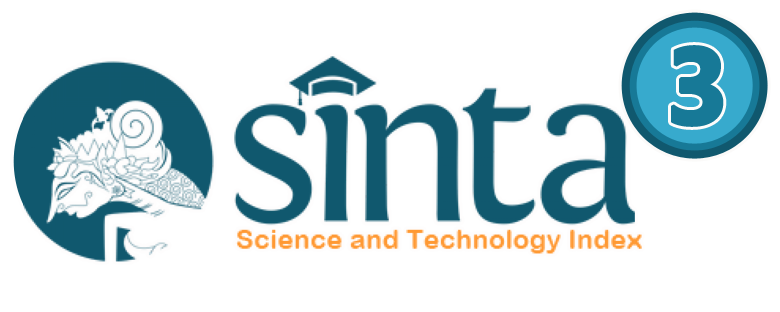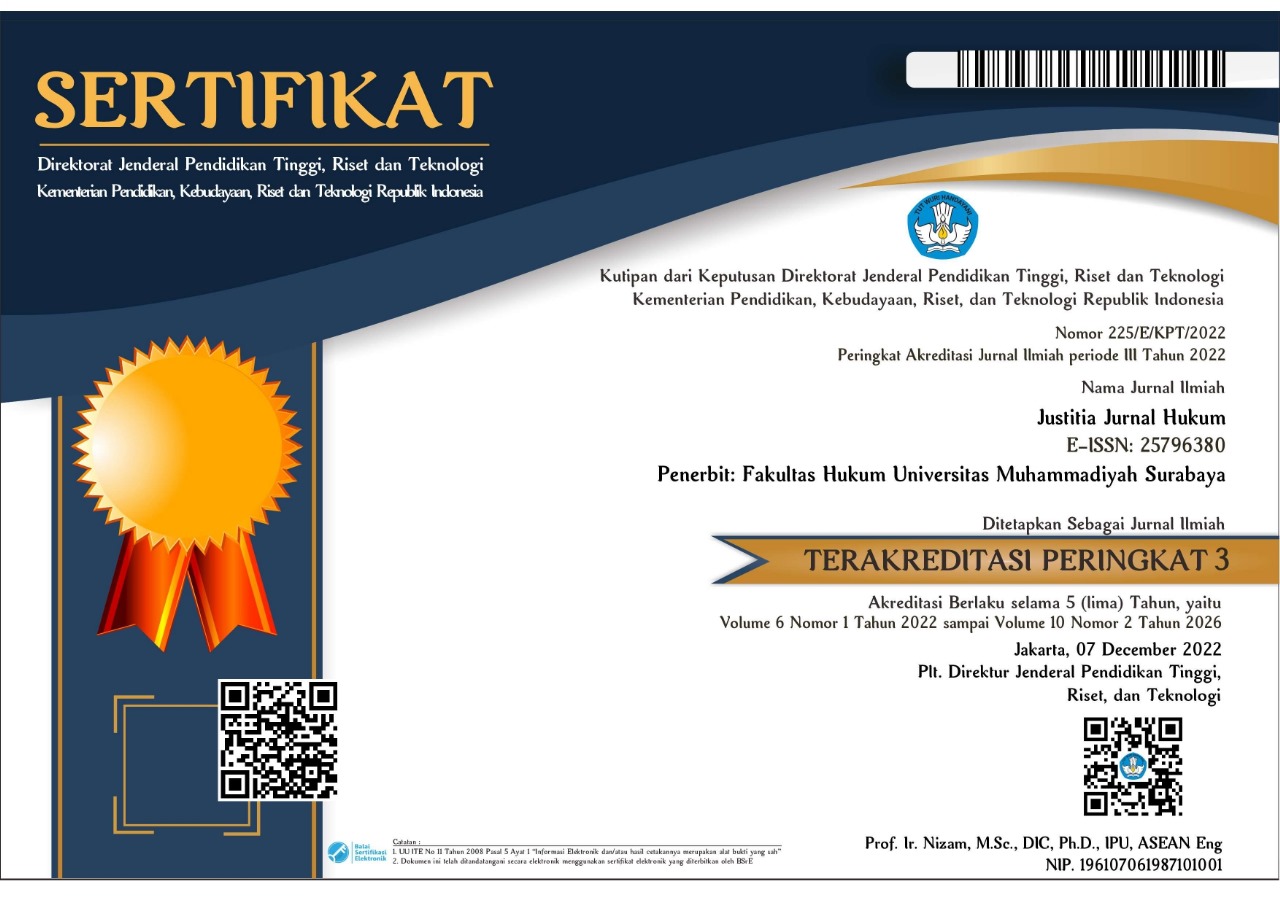Quick Menu
Publicaiton Ethic
Justitia Jurnal Hukum is committed to maintaining the highest ethical standards for all parties involved in the act of publishing in peer-reviewed journals: authors, journal editors, bestary partners and publishers. The Legal Science Journal has a publishing ethic, both internally and externally, and we state the following principles of Publication Ethics and Malpractice Statements based on these standards. All articles that do not comply with these standards will be removed from publication at any time even after publication. In accordance with the code of ethics, we will report any cases of suspected plagiarism or double publishing to the appropriate authorities. Justitia Jurnal Hukum will utilise plagiarism detection software to screen submitted papers at all times.
Editors, Reviewers, and authors at Justitia Jurnal Hukum have several key responsibilities to ensure the implementation of a good publication process in accordance with existing rules, these responsibilities include;
Editor Responsibilities
- Publication Decisions: editors are fully responsible for making objective, informed decisions on which articles to process, be it acceptance, revision, or rejection. editors are obliged to consider the significance, originality, and quality of the research, and most importantly the suitability to the scope and purpose of Justitia Jurnal Hukum. editors should base their decisions on the evaluations provided by the reviewers.
- Peer Review Process: the editor supervises the implementation of the article review conducted by the reviewer, identifying reviewers who match their expertise with the article to be reviewed. the editor must ensure that the review process carried out by the reviewer runs objectively and constructively, providing feedback to the author so as to improve the quality of the article. the editor also regulates communication between authors and reviewers so that a fair and efficient review process can be achieved.
- Editorial Policies: editors establish and enforce the journal's defined editorial policies, guidelines, and ethical standards. editors must ensure that authors and reviewers are aware of these policies and adhere to them. in addition, editors also have a moral burden to keep abreast of the latest emerging ethical developments and apply them in good practice to promote integrity Justitia Jurnal Hukum.
- Quality Control: The editor has an obligation to maintain the quality of all content in the journal, overseeing the editing and proofreading process to ensure accuracy, clarity, and adherence to the journal's writing and formatting guidelines. The editor may also liaise with authors to improve the overall quality of articles to be published.
Reviewer Responsibilities
- Reviewers are required to keep information relating to the manuscript under review confidential. Reviewers convey to the editor all information that will be the editor's reason for accepting or rejecting the reviewed manuscript. Reviewers provide an evaluation of the manuscript in accordance with their knowledge.
- Each submitted manuscript goes through a thorough review process for publication. The editor initially assesses the suitability of the manuscript, after which it is sent to two reviewers. The editors are independent, evaluate the manuscript, and the final decision on publication is based on their recommendation. This review process applies to all manuscripts, including those submitted by members of the journal's Editorial Board.
- The reviewers will assess the content of the manuscript solely on the basis of its quality and relevance, without considering factors such as the author's gender, sexual preference, religious beliefs, nationality, ethnic origin, or political philosophy. Editors should therefore ensure that manuscripts sent to reviewers are those in which the author's identity has been removed, ensuring an unbiased evaluation process that focuses on the quality of the work and not on the personal characteristics or beliefs of the author.
- Reviewers of manuscripts are required to keep the information contained in them confidential. This means that they must ensure that the content of the manuscript remains private and not disclose it to anyone unauthorised. This confidentiality is essential to protect the integrity of the review process and the intellectual property of the authors.
- Manuscript reviewers are required to notify the editor if they find any violations in the manuscript. This is to ensure that any ethical or content-related issues are promptly reported and addressed. The purpose of this reporting is to maintain the integrity and quality of the publication.
- Manuscript reviewers are required to assess the manuscript in an impartial manner, with the aim of achieving objectivity. Their evaluation should reflect their opinion of the work presented in the manuscript, providing a judgement on its quality and significance.
- If a reviewer feels that they do not have the necessary qualifications to review the manuscript or if they anticipate not being able to complete the review in a timely manner, they should inform the editor and withdraw from the review process. This is to ensure that the review process maintains a high standard of expertise and efficiency.
Author Responsibilities
- Reporting standards require authors to present their research findings in a clear, honest, and transparent manner, without fabrication, falsification, or inappropriate manipulation of data. Authors must also provide a clear and unambiguous description of their research methods, allowing others to replicate and validate their findings. This ensures the integrity and reliability of scientific publications.
- Authors are expected to ensure that the work they submit is original, not plagiarised, and has not been previously published. Making deliberately untrue or inaccurate statements is considered unethical. If authors use the work or words of others, they must cite or quote them appropriately and accurately acknowledge their contribution to the work.
- Authors are expected to provide raw data related to their research paper for review by the editors. In addition, authors must be willing to retain this data for a reasonable period of time after the publication of their paper. This ensures transparency, reproducibility, and the ability of others to verify and build upon the findings presented in the research.
- Authors have an ethical responsibility to submit papers that have been conducted in an honest and morally accountable manner. This includes complying with relevant laws and regulations when conducting research and ensuring that the work is done responsibly and with integrity.
- authors are responsible for disclosing any financial or other conflicts of interest that could potentially impact the outcome or interpretation of their manuscript. This includes disclosing all sources of financial support for the project. This transparency ensures the integrity and credibility of the research presented.
- Multiple, repetitive, or concurrent publication refers to the practice of submitting and publishing the same research findings in more than one journal or primary publication. This behaviour is considered unethical and unacceptable in academic publishing. Authors should avoid submitting the same manuscript to multiple journals simultaneously, as this undermines the integrity of the publication process.
- If an author identifies significant errors or inaccuracies in their published work, it is their responsibility to notify the journal editor or publisher immediately. Authors should work with the editor to retract or correct the paper, to ensure the accuracy and integrity of the published research.
Retraction Policy
Journal editors do not have complete autonomy in deciding which articles to publish. Their decisions are guided by the journal's editorial board policies and constrained by legal requirements related to issues such as defamation, copyright infringement, double publishing, and plagiarism. Once an article is published, it will generally remain unchanged, but there may be exceptional circumstances that require the article to be withdrawn or deleted.
In the context of academic publishing, retraction of a published article may be initiated by the journal editor, the author, or their institution. In certain cases, the retraction process requires an apology for previous errors and thanks to those who identified the errors. Retracted scientific articles should be accompanied by a statement indicating that the original article should not be published, and its data and conclusions should not be used as a basis for future research.
Article Withdrawal
This circumstance may occur if there is an error in the initial version of the article or if the article has been mistakenly submitted to either Justitia Jurnal Hukum or another journal. In addition, this may also occur if there is a breach of the scientific code of conduct, such as multiple submissions, incorrect authorship claims, plagiarism, self-plagiarism, or improper use of data. In such cases, authors who are aware of such violations may withdraw their articles by sending a letter of withdrawal to the editorial board of Justitia Jurnal Hukum.
Article Deletion: Legal Restrictions
In what may be rare cases, an article may need to be removed from Justitia Jurnal Hukum's online database. This will happen if the article is found to be defamatory, fraudulent, violates legal rights, is subject to a court order, or poses a threat to state security. In such situations, the article's metadata (title and author) will remain visible, but the actual text will be replaced with a screen stating that the article has been removed for legal reasons.
Article Replacement
In situations where an article, if implemented, has the potential to harm public health, the author of the original article may choose to retract the flawed version and replace it with an improved version. The retraction process will be followed, but with the difference that the database retraction notice will include a link to the corrected version of the article and its historical record.










